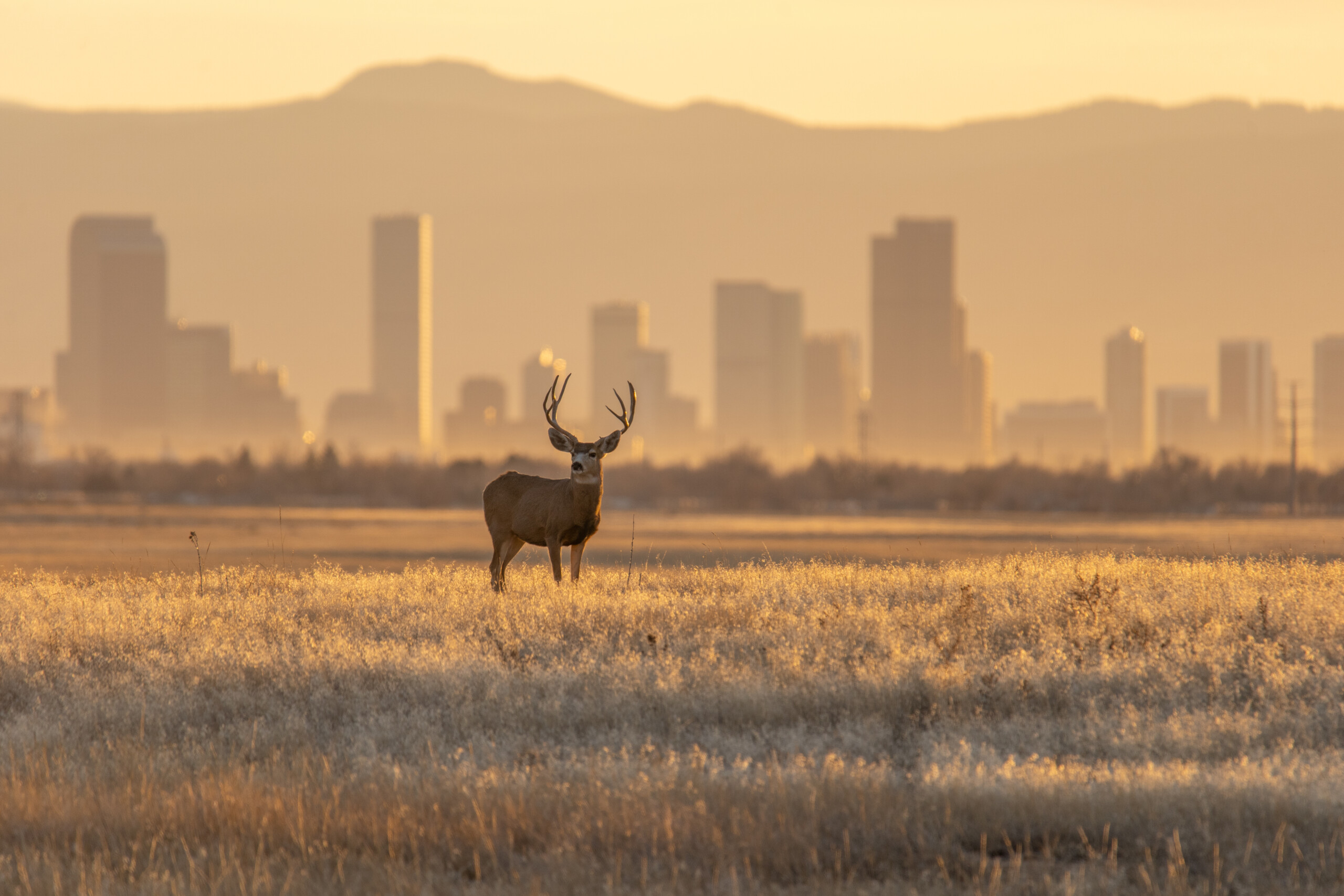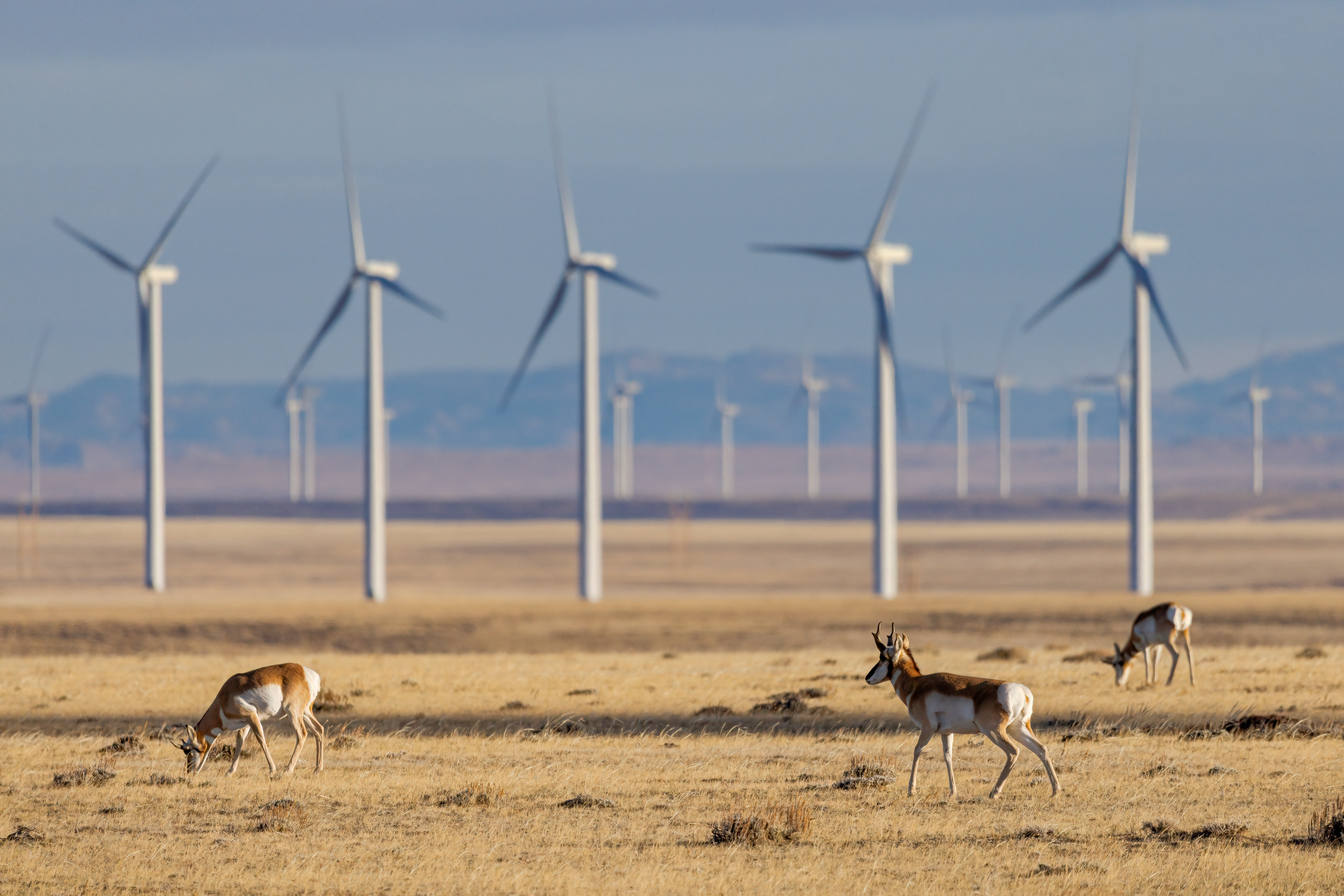April 22, 2024
DENVER – The Colorado Renewable Energy Siting Coalition, comprised of six conservation and environmental groups, today welcomed the introduction of a study bill that will examine the current pathways for siting utility-scale renewable energy projects and evaluate the impacts of those facilities on wildlife and communities.
Sponsored by state Sen. Chris Hansen and Senate President Steve Fenberg, SB24-212 requires the Colorado Energy Office, in cooperation with the state departments of Local Affairs and Natural Resources, to develop a repository of model codes and ordinances for renewable energy projects and for Colorado Parks and Wildlife to create high-priority habitat maps and best management practices specific to impacts from renewable energy technologies.
The goal is to provide frameworks that local and Tribal governments may consider and adapt to evaluate local energy resources. The study bill would require the state Energy and Carbon Management Commission, when requested by local or Tribal governments, to provide technical support on the development or review of proposed local codes governing renewable energy generation projects and energy transmission projects. The state Division of Parks and Wildlife would also be required to provide similar support on request and assist governments in identifying high-priority wildlife habitat and project-specific impacts based on the best available science. In addition, the Colorado Energy Office must submit a report to the legislature by June 30, 2025 that evaluates local government processes, whether reasonable pathways to renewable energy siting exist in areas with suitable wind and solar resources, and the impacts of renewable energy projects on wildlife and their habitats.
Beginning in late 2022, the Coalition evaluated policies from across the country and engaged a diverse set of stakeholders with a goal of developing a viable renewable siting policy proposal to accelerate deployment of wind and solar projects while preventing harm to important habitat, wildlife, and community values.
The study legislation introduced today incorporates several key priorities identified in the stakeholder engagement conducted by the Coalition, including: updating high-priority wildlife habitat maps to identify where renewable projects will have impacts; assessing community benefit agreements; respecting tribal rights over the Brunot area; and providing technical support for counties.
The rapid buildout of renewable energy projects faces several challenges. An increase in local development bans and restrictive zoning ordinances creates uncertainty for permitting and siting of energy projects, putting at risk the state’s decarbonization goals. Ensuring there are reasonable pathways to deploy renewable energy to meet our statewide goals while protecting our natural heritage and community values is essential.
To meet energy production targets established by Gov. Jared Polis that call for the transition to 100% renewable energy generation by 2040, as well as goals set by the state legislature, Colorado must greatly expand utility-scale wind and solar projects. A recent study by the Colorado Energy Office shows that the state must triple the amount of wind power and increase solar energy fivefold by 2040 to achieve these goals.
Coloradans widely support renewable energy when those projects are built in alignment with the values of the people of the state. According to annual polling for the State of the Rockies Conservation In the West, 82% of Colorado voters polled think more emphasis should be placed on conserving wildlife migration routes than on new development in those areas; approximately 78% of Colorado voters polled believe we can both increase the production of clean energy while also preserving natural areas, wildlife habitat, and the character of our communities.

Members of the Colorado Renewable Energy Siting Coalition, which includes Audubon Rockies, Clean Air Task Force, Conservation Colorado, The Nature Conservancy, Theodore Roosevelt Conservation Partnership and Western Resource Advocates, made the following statements:
“We know that to meet its ambitious clean energy goals, Colorado must rapidly increase renewable energy development across the state. Today’s bill is a critical step forward in meeting this challenge while ensuring new development does not exacerbate threats to wildlife,” said Severiano DeSoto, Energy Siting Policy Advisor at WRA. “Local and Tribal governments will be able to tap into the added expertise and resources of a number of state agencies to ensure that communities can lead development in a way that balances local values, preserves the vital habitats of wildlife and meets clean energy needs in a responsible, science-based manner.”
“This legislation marks an important step in Colorado’s journey toward responsible and expedited renewable energy development. It recognizes the crucial role of local governments and Tribes by allocating state resources to support their efforts,” said Brien Webster, Public Lands Campaign Manager at Conservation Colorado. “In addition, this bill supports the need for a clearer understanding of the challenges associated with renewable energy and its potential impacts on wildlife, which are critical to achieving a more sustainable energy future.”
“As Colorado leaders work hard to address the challenges of climate change head-on, we are hearing loud and clear from the public that this should not be done at the cost of our birds and wildlife populations or the quality of life that make this state so special to live in,” said Daly Edmunds, Director of Policy and Outreach at Audubon Rockies. “Taking time to understand the current situation is an important step to developing a sound process in how renewable energy development should proceed.”
“SB24–212 is a valuable step in the right direction for achieving Colorado’s clean energy goals in a way that balances climate, conservation, and community priorities. Importantly, it keeps Colorado communities at the forefront of decision-making on clean energy projects in their counties, while simultaneously creating accessible resources to support those decisions, and establishing foundational science-based information to safeguard wildlife and the habitat on which it depends,” said Chris Menges, Director of Climate Action at The Nature Conservancy in Colorado. “By helping to minimize potential conflict and align Colorado values around conservation, communities and clean energy, the bill helps create the enabling conditions we need for a responsible, community-lead, clean energy future.”
“This study bill is the first step in helping our state and the renewable energy industry in understanding how to minimize adverse impacts to wildlife habitat when siting future projects,” said Liz Rose, Colorado Field Representative for the Theodore Roosevelt Conservation Partnership. “Smart from the start siting will ensure our hunting and fishing traditions continue for years to come. TRCP looks forward to evaluating study results, and we encourage the ongoing assessment of renewable energy development processes for the benefit of Colorado’s people and wildlife.”
Media Contact:
James Quirk, WRA, 908.902.3177, james.quirk@westernresources.org
Lindsay Schlageter, The Nature Conservancy, 612.968.3141, Lindsay.Schlageter@tnc.org


